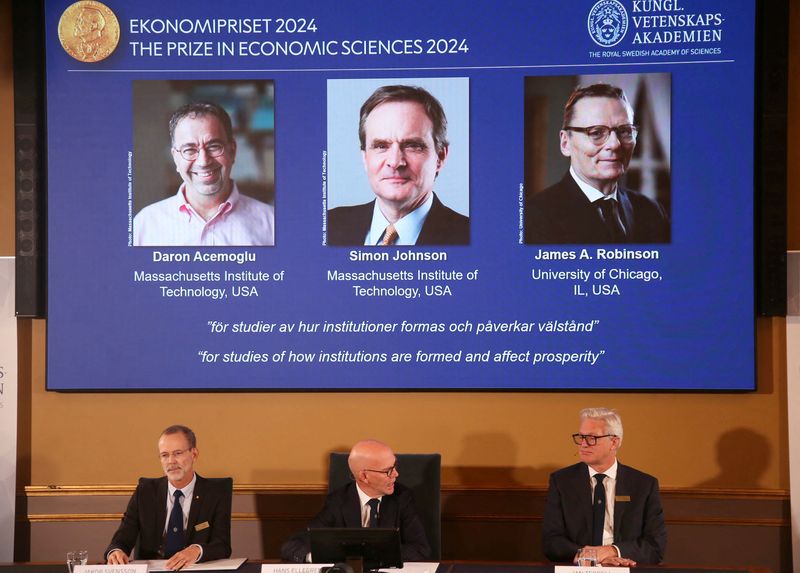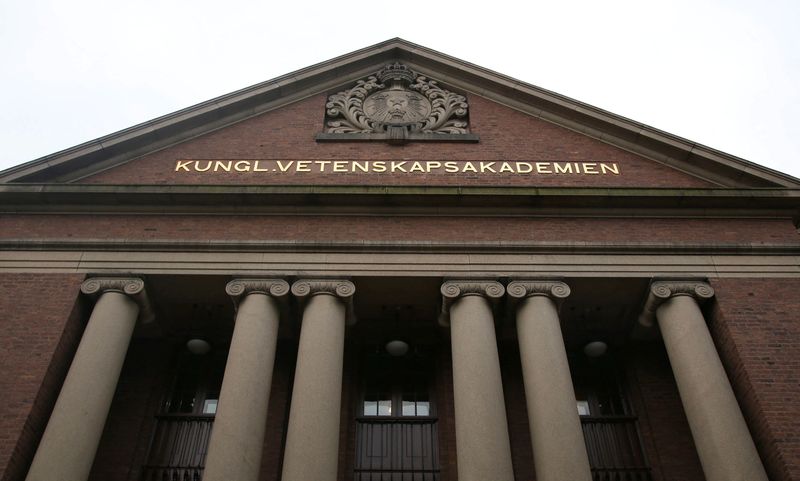By Simon Johnson, Karolina Tagaris
STOCKHOLM (Reuters) -Three U.S.-based academics won the 2024 Nobel economics prize on Monday for research that explored the aftermath of colonisation to understand why global inequality persists today, especially in countries dogged by corruption and dictatorship.
Simon Johnson and James Robinson, both British-American, and Turkish-American Daron Acemoglu were commended for their work on "how institutions are formed and affect prosperity", the Royal Swedish Academy of Sciences said.
"Reducing the vast differences in income between countries is one of our time's greatest challenges," said Jakob Svensson, Chair of the Committee for the Prize in Economic Sciences.
"They have identified the historical roots of the weak institutional environments that characterize many low-income countries today," he told a press conference.
The award came a day after a World Bank report showed that the world's 26 poorest countries - home to 40% of its most poverty-stricken people - are more in debt than at any time since 2006, highlighting a major reversal in the fight against poverty.
The prestigious award, formally known as the Sveriges Riksbank Prize in Economic Sciences in Memory of Alfred Nobel, is the final prize to be given out this year and is worth 11 million Swedish crowns ($1.1 million).
Acemoglu told reporters in Athens that data gathered by pro-democracy groups showed that public institutions and rule of law in many parts of the world were currently being weakened.
"Authoritarian growth is often more unstable and doesn't generally lead to very rapid and original innovation," he said, referring to China as "a bit of a challenge".
Johnson told Reuters by telephone that established institutions in the United States were under stress, notably due to Donald Trump's refusal to acknowledge he lost the 2020 election.
"I think that's the biggest concern that I see in the industrialised world," he said, adding the Nov. 5 presidential election was "a serious stress test" for U.S. democracy.
Acemoglu and Johnson work at the Massachusetts Institute of Technology, while Robinson is at the University of Chicago, where he spoke at a press conference on Monday and referred to his co-laureates as his "best friends."
"I'm not someone who thinks that economists have a kind of cure for everything, or they have some silver bullet," he said. "Ideas are important in terms of giving people levers or giving people ways to think about the problems in their society."
He said all humans have the same aspirations and a shared history but have nonetheless "built very different societies in different parts of the world."
"The first thing is to think about a question that's relevant to those people, to their context and to their aspirations," he said of his research.
'REVERSAL OF FORTUNE'
The laureates' research showed how European colonisation had dramatic but divergent impacts across the world, depending on whether the coloniser focused on extraction of resources or the setting up of long-term institutions for the benefit of European migrants.
This, they found, resulted in a "reversal of fortune" where former colonies that were once rich become poor, while some poorer countries - where institutions were often set up - were in the end able to garner some generalised prosperity through them.
Another finding covered how "dangerous" it was to colonise an area: the higher mortality among the colonisers, the lower today's current output per capita, a measure of prosperity.
The economics award is not one of the original prizes for science, literature and peace created in the will of dynamite inventor and businessman Alfred Nobel and first awarded in 1901, but a later addition established and funded by Sweden's central bank in 1968.
Past winners include a host of influential thinkers such as Milton Friedman, John Nash - played by actor Russell Crowe in the 2001 film "A Beautiful Mind" - and, more recently, former U.S. Federal Reserve Chairman Ben Bernanke.
Research into inequality has featured strongly in recent awards. Last year, Harvard economic historian Claudia Goldin won the prize for her work highlighting the causes of wage and labour market inequality between men and women.
In 2019, economists Abhijit Banerjee, Esther Duflo and Michael Kremer won the award for work on fighting poverty.

The economics prize has been dominated by U.S. academics since its inception, while U.S.-based researchers also tend to account for a large portion of winners in the scientific fields for which 2024 laureates were announced last week.
That crop of prizes began with U.S. scientists Victor Ambros and Gary Ruvkun winning the prize for medicine on Monday and concluded with Japan's Nihon Hidankyo, an organisation of survivors from Hiroshima and Nagasaki who campaigned for the abolition of nuclear weapons landing the award for peace on Friday.($1 = 10.3967 Swedish crowns)
